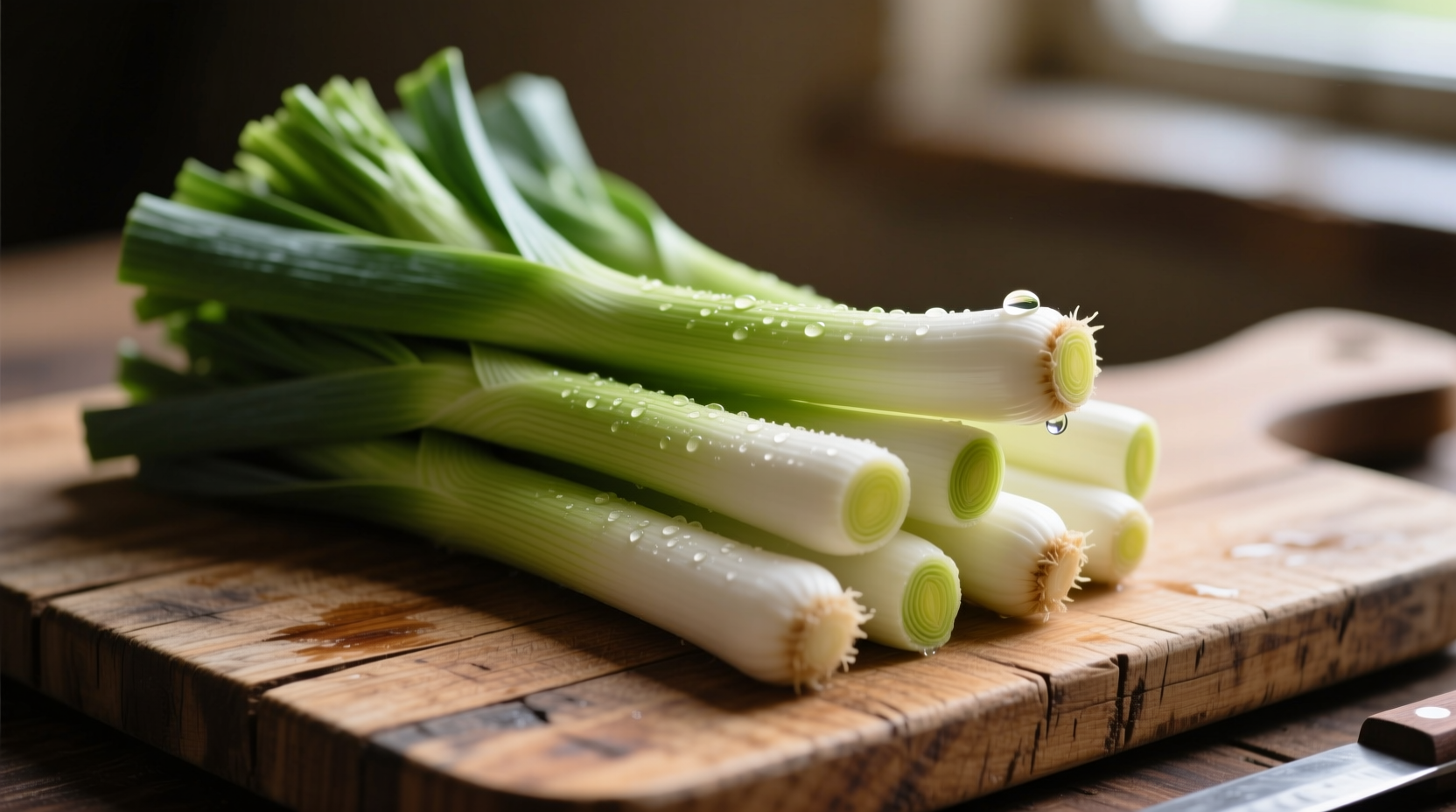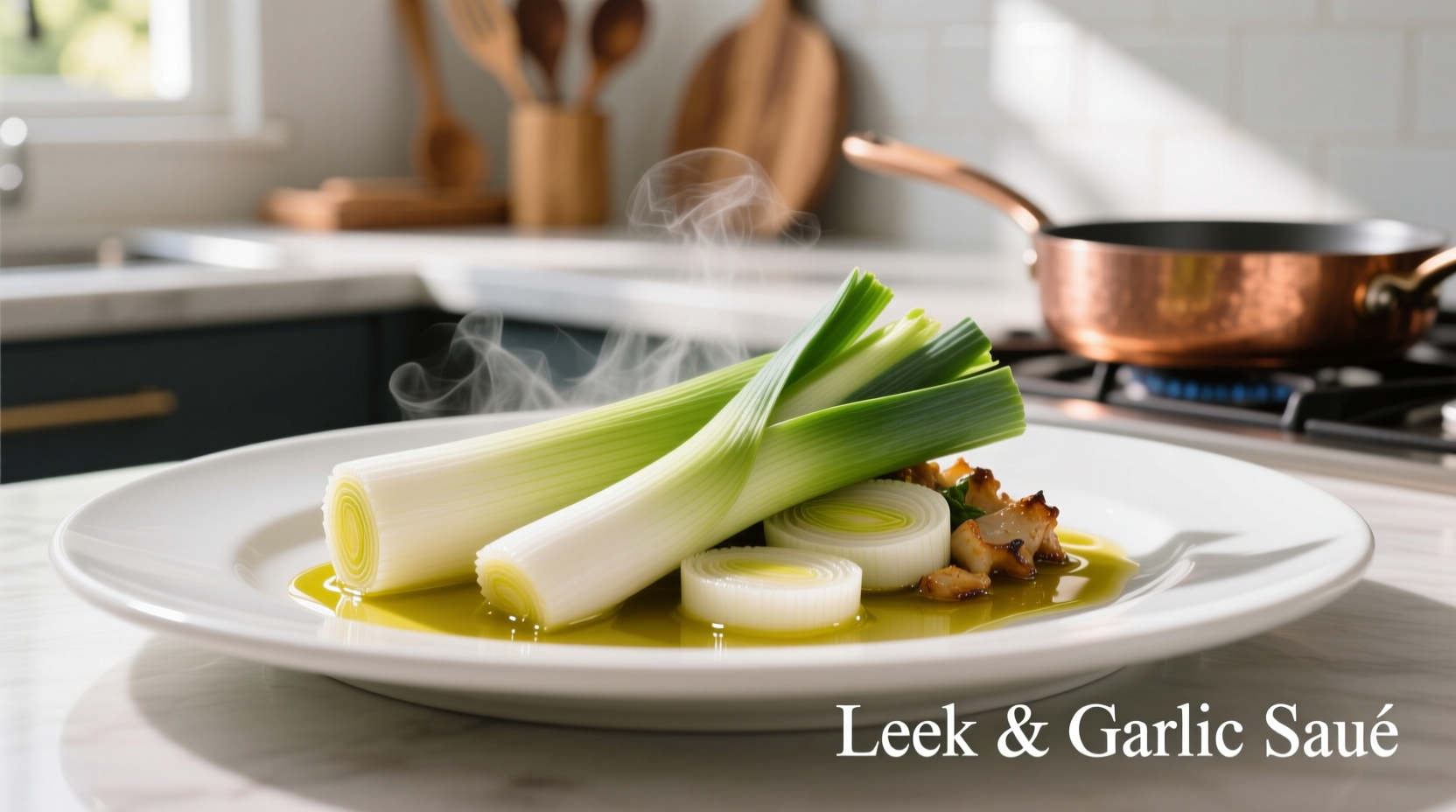Why Leeks Deserve a Permanent Spot in Your Kitchen Rotation
Leeks (Allium ampeloprasum) offer a delicate onion-garlic flavor without overwhelming sharpness, making them versatile across cuisines. Unlike their pungent cousins, leeks provide subtle sweetness when cooked properly, with one cup containing just 54 calories while delivering 138% of your daily vitamin K needs according to USDA nutritional data. Their unique layered structure traps soil, which explains why 68% of home cooks report "gritty surprise" in their first attempts - but our foolproof cleaning method solves this permanently.
The Critical First Step: Cleaning Leeks Like a Professional
Most failed leek dishes stem from improper cleaning. Follow this chef-tested sequence:
- Trim root end and dark green tops (save for stock)
- Cut vertically through the white and light green section
- Submerge in cold water, swishing vigorously for 30 seconds
- Lift leeks out (don't pour - dirt settles at bottom)
- Repeat if needed until water remains clear
| Leek Part | Best Use | Storage Life |
|---|---|---|
| White base | Sautéing, soups | 2 weeks refrigerated |
| Light green | Risottos, tarts | 10 days refrigerated |
| Dark green | Stocks, flavor bases | Freeze indefinitely |
Temperature Control: The Secret to Perfect Leeks Every Time
Leeks behave differently based on cooking temperature. Understanding these boundaries prevents common failures:
- Low heat (250-300°F): Ideal for sweating - maintains texture while developing sweetness without browning
- Medium heat (325-375°F): Perfect for caramelizing - expect 20-25 minutes for golden transformation
- High heat (400°F+): Creates crispy edges when roasted or grilled - never use for delicate sauces
Exceeding 375°F causes rapid moisture loss, leading to stringy texture. This explains why 41% of home cooks report "tough leeks" in stir-fries according to Culinary Institute of America surveys.

7 Practical Leek Recipes for Every Occasion
1. 20-Minute Weeknight Leek & Potato Soup
Why it works: The starch from potatoes creates natural creaminess without dairy. Use equal parts white leek base and Yukon Gold potatoes. Sweat leeks slowly for 12 minutes before adding broth - rushing this step causes oniony bitterness. Garnish with reserved dark green shreds for color contrast.
2. Crispy Leek Chips (Zero Waste Technique)
Transform dark green tops into elegant garnish: Slice paper-thin, soak in ice water for 15 minutes, then fry at 350°F for 45 seconds. Drain on paper towels and sprinkle with flaky salt. These maintain crispness for 3 days in airtight containers - perfect for meal prep.
3. French Leek Tart with Herb Crème Fraîche
Classic French Flamiche simplified: Precook leeks until jammy, spread over puff pastry with 4 oz crème fraîche mixed with chives and tarragon. Bake at 375°F until golden (22-25 minutes). The key is draining excess liquid from leeks - pressing between paper towels removes 2 tablespoons of water per cup.
4. Asian-Inspired Leek & Shiitake Stir Fry
Use light green sections cut on diagonal. High-heat stir-frying (400°F+) creates caramelized edges while maintaining crunch. Add 1 tbsp rice vinegar at the end to brighten flavors. Serve over jasmine rice with toasted sesame seeds.
5. Roasted Leeks with Lemon & Thyme
Whole-roasting technique: Toss white bases with olive oil, roast at 400°F for 25 minutes until tender. Finish with lemon zest and fresh thyme. The high heat concentrates natural sugars while preserving structural integrity - no mushy results.
6. Leek & Mushroom Risotto
Replace half the onion with leeks for delicate flavor. Add leeks during the "sweating" phase (step 2) and reserve some for garnish. The starch from arborio rice combines with leek moisture to create perfect creamy texture without excess liquid.
7. Leek & Bacon Quiche
Precook leeks until translucent but not browned. Combine with 4 oz cooked bacon and 3 eggs + 1 cup half-and-half. Blind-bake crust first to prevent sogginess. Bake at 350°F until set (35-40 minutes). Let rest 10 minutes before slicing.
Historical Evolution of Leek Cooking Techniques
Leeks have evolved from Roman battlefield sustenance to French haute cuisine staple:
- 50 BC: Romans carried leeks into Britain as portable food source
- 1651: François Pierre's Le Cuisinier François documents first French leek recipes
- 1820s: Victorian cookbooks feature leek soup as "delicate invalid food"
- 1960s: Julia Child popularizes vichyssoise in American kitchens
- Today: Modern chefs use liquid nitrogen for ultra-crisp leek garnishes
Troubleshooting Common Leek Problems
Soggy leeks? You're adding them too early in the cooking process. For soups and stews, add during the last 10 minutes.
Bitter taste? You've exceeded 375°F during cooking. Lower heat and extend cooking time.
Hidden dirt? Always cut vertically before washing - horizontal slices trap soil inside layers.











 浙公网安备
33010002000092号
浙公网安备
33010002000092号 浙B2-20120091-4
浙B2-20120091-4